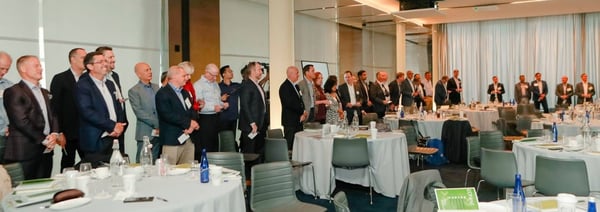Today’s the day. I’m finally going to say something about that billion dollar idea that I’ve had in the back of my mind for months. I’ve been waiting for the perfect opportunity to speak up and today’s meeting is my chance! I’ve been a bit reluctant to share because my point will probably make senior leadership look kind of stupid. And maybe I’m the one who’s stupid and I’ll get laughed out of the room. Actually, now that I think about it, I better not say anything. I should just do my job and leave the decision-making to the leadership team. If they need my help, they’ll ask.
Can you relate? Even if you’re the most senior leader in your organization, you can probably still relate because you know you have employees that are holding back.
How frustrating is that? Why can’t they just speak their minds?
Trust. That’s all it comes down to.
Trust that the team will respect each other’s opinion. Trust that there is uniformed buy-in to the organizational mission. Trust that even if my idea is the most nonsensical thought in corporate history, my team will still listen the next time I speak up. Trust that I won’t be fired for speaking my mind.
So how do we create that environment?
At our Edison Director Forum last month, we had the privilege of hearing from Ori Brafman about his research on decentralized organizations, where decision-making is delegated throughout the team rather than sitting within senior leadership. He cited a dozen anecdotes around flourishing leaderless systems and the downfall of those that followed top-down leadership.

A group exercise facilitated by Ori to demonstrate the value of everyone in the room sharing their ideas.
In each top-down, centralized group, once the leader was conquered, the whole group was conquered. If there is nobody to give orders, nobody knows what to do. Once the Spanish defeated Montezuma, the Aztecs were done for. The head of the organization was cut off and the body withered.
When each decentralized organization was under attack, they thrived. They grew stronger. An example that Ori provided that resonated with me the most was the evolution of Napster, a peer-to-peer file sharing network. I was a bit too young to participate in the Napster craze, but once it was shut down, I read about it - a lot. And then my best friend taught me about Kazaa - a network that quickly sucked me in and stimulated me to download music. But, then that got shut down, so I started downloading music from LimeWire; and then BearShare. The P2P file sharing network grew and grew – there was never a shortage of people uploading and downloading music. It didn’t matter what the name of the computer program was, the movement continued.
Why?
Trust. That might seem a little crazy that I was willing to trust these funny-named computer programs that might give my computer a virus. But it wasn’t the computer program that I trusted; it was the participants within the network that I trusted – my friends, schoolmates, kids from summer camp. I trusted them and so I trusted the funny-named computer programs.
And so I participated. I was empowered. I could download music at the click of a button, and for the most part, it worked. Because everyone in the network was there for the same reason – file sharing. There was complete organizational buy-in. And if a file didn’t work or was improperly named (“a stupid idea”) then I moved onto the next one. It didn’t matter.
And when each program was shut down, I relied on my friends to tell me about the new go-to program. The file sharing network continued. It could not be killed.
Ori demonstrated that these networks of trust determine success or failure, regardless of whether they were things or people or a mixture of both, as usually is the case. File sharing was a network driven by people in turn driving the network in a virtual sustainable cycle. As long as I trust the people in the group, I continue to participate.
In order to proliferate ideas, a company's chain of trust must also be reinforced with an evergreen, healthy environment, one with cultures that are:
- Open
- Transparent
- Respectful
Developing that chain of trust and reinforcing within an evergreen healthy environment (open, transparent, respectful cultures) is how things proliferate, especially ideas. And even if I’m not the one with billion-dollar idea, maybe my participation and trusting manner will encourage another person with that idea to speak up. It was an inspiring day for all.
Click here to watch Ori Brafman's keynote speech at our Edison Director Forum.

